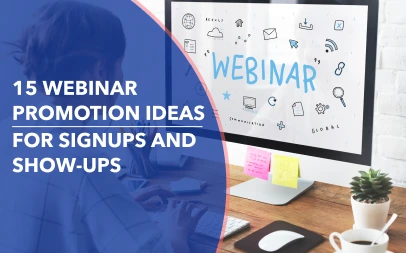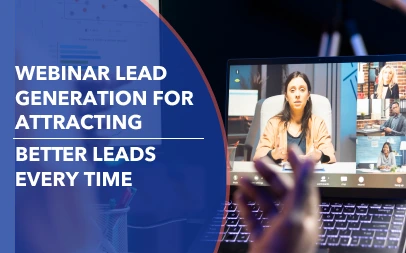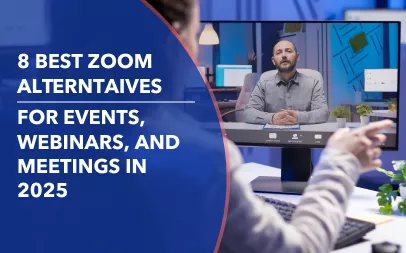How to Maximize the Benefits of Webinar and Seminar Events


Webinars and seminars have become increasingly popular in today's digital age. They offer a convenient way for businesses and individuals to share knowledge, connect with their audience, and establish themselves as industry experts. Understanding the importance of webinars and seminars is key to maximizing their benefits.
Understanding the Importance of Webinars and Seminars
Webinars have revolutionized the way information is shared. In today's fast-paced digital world, people crave knowledge that is easily accessible and convenient. Webinars provide just that - a virtual platform where participants can join from anywhere in the world without the need for travel or physical attendance.
However, traditional seminars still hold their relevance. There is something special about face-to-face interactions and the opportunity to network with like-minded individuals. Seminars offer a more personal touch, allowing participants to engage in real-time conversations and create lasting connections with fellow attendees.
The Role of Webinars in Today's Digital World
Webinars have become a powerful tool for businesses and individuals to showcase their expertise, products, or services. By hosting webinars, you can reach a wider audience and establish yourself as a thought leader in your industry. The ability to record and replay webinars also makes them a valuable resource that can be accessed even after the live event has ended.
Moreover, webinars offer the flexibility to cater to the busy schedules of participants. With on-demand webinars, attendees can choose a time that suits them best, ensuring maximum engagement and participation.
Furthermore, webinars allow for interactive elements that enhance the learning experience. Through features such as live chat, polls, and Q&A sessions, participants can actively engage with the presenter and other attendees. This interactivity fosters a sense of community and encourages knowledge sharing among participants.
In addition, webinars can be a cost-effective solution for both organizers and attendees. Without the need for venue rentals, travel expenses, or accommodation, webinars eliminate many of the financial barriers associated with attending traditional seminars. This affordability makes webinars accessible to a wider audience, including individuals who may not have the means or resources to attend in-person events.
The Continued Relevance of Traditional Seminars
While webinars provide numerous advantages, traditional seminars still hold their ground in terms of authenticity and engagement. Seminars offer a unique opportunity for participants to interact face-to-face with speakers and fellow attendees. The ability to ask questions, engage in group discussions, and network with industry professionals can significantly enhance the learning experience.
Additionally, seminars provide a break from the digital world. In an era where technology dominates our lives, attending a seminar allows participants to disconnect from screens and focus on the presented content. The tactile experience of attending a seminar can create a memorable and immersive learning environment.
Moreover, seminars often feature keynote speakers who are renowned experts in their respective fields. The opportunity to listen to these industry leaders in person can be inspiring and motivating. Being in the same room as these speakers allows participants to witness their passion and expertise firsthand, creating a unique and impactful experience.
Furthermore, seminars provide an ideal setting for networking. The informal conversations that take place during breaks or social events can lead to valuable connections and collaborations. Meeting like-minded individuals face-to-face can foster long-lasting professional relationships that extend beyond the duration of the seminar.
Lastly, seminars offer a sense of exclusivity. Limited seating and the need for physical attendance create an atmosphere of importance and prestige. Being part of a select group of individuals who have the opportunity to attend a seminar can enhance one's professional reputation and credibility.
Planning Your Webinar or Seminar for Maximum Impact
Planning plays a crucial role in the success of any webinar or seminar. To ensure maximum impact, consider the following key elements.
When it comes to planning a webinar or seminar, there are several factors to take into consideration. From identifying your target audience to selecting the perfect topic, every step plays a vital role in creating an impactful and engaging event.
Identifying Your Target Audience
Before diving into the planning process, it is essential to identify your target audience. Understanding your audience's needs, preferences, and pain points will help you tailor your content and presentation style to resonate with them. Conduct market research, surveys, and engage with your existing audience to gather insights.
By understanding your target audience, you can develop a comprehensive strategy that caters to their specific interests and requirements. This will not only increase the chances of attracting a larger audience but also ensure that the content delivered during the webinar or seminar is relevant and valuable.
Choosing the Right Topic
Selecting the perfect topic is crucial for attracting and engaging your target audience. Identify the current trends or pain points in your industry and choose a topic that addresses those issues. Make sure the topic aligns with your expertise and allows you to demonstrate your knowledge and value.
When choosing a topic, it's important to strike a balance between being informative and engaging. You want to provide valuable insights while keeping your audience captivated throughout the event. Consider incorporating interactive elements, such as Q&A sessions or live polls, to encourage active participation and keep attendees invested in the discussion.
Selecting the Perfect Date and Time
The timing of your webinar or seminar can significantly impact attendance rates. Consider your audience's time zones and availability when selecting a date and time. Avoid scheduling your event during peak hours or conflicting with other industry-related events. Stick to a schedule that gives participants ample time to plan and prepare.
Additionally, consider the duration of your webinar or seminar. While it's important to cover all the necessary information, it's equally crucial to respect your audience's time. Aim for a duration that allows for a comprehensive discussion without overwhelming participants.
Furthermore, consider promoting your event well in advance to ensure maximum attendance. Utilize various marketing channels, such as social media, email newsletters, and industry forums, to spread the word and generate interest.
By carefully planning your webinar or seminar, taking into account your target audience, topic selection, and timing, you can create an impactful and engaging event that leaves a lasting impression on your attendees. Remember, the success of your event relies not only on the content but also on the overall experience you provide.
Implementing Effective Promotion Strategies
Promotion is key to attracting participants to your webinar or seminar. Implementing effective strategies will ensure maximum exposure and engagement.
When it comes to promoting your webinar or seminar, there are several strategies you can implement to make sure your event gets the attention it deserves. In addition to the traditional methods of promotion, such as advertising and word-of-mouth, leveraging social media and email marketing can take your promotional efforts to the next level.
Leveraging Social Media for Promotion
Social media platforms have become powerful promotional tools. With billions of users worldwide, platforms like Facebook, LinkedIn, Twitter, and Instagram offer a vast audience for you to tap into. By creating buzz around your event on these platforms, you can generate interest and attract participants.
One effective way to leverage social media for promotion is by creating engaging graphics that capture the essence of your webinar or seminar. Eye-catching visuals can grab the attention of your target audience and make them curious about what you have to offer. Additionally, sharing sneak peeks of the content can pique their interest and make them eager to learn more.
Testimonials from previous participants can also be a powerful tool in generating interest. By showcasing positive feedback and success stories, you can build credibility and trust with your potential participants. People are more likely to sign up for an event when they see that others have had a positive experience.
Email Marketing: A Powerful Tool for Webinars and Seminars
Email marketing is another powerful tool to promote your webinar or seminar. With a targeted email list, you can reach out to individuals who have already shown an interest in your topic or industry. Craft personalized invitations that highlight the benefits and key takeaways participants can expect from attending your event.
One effective strategy is to create a sense of exclusivity by offering limited spots or early-bird discounts to those on your email list. This can create a sense of urgency and encourage people to sign up sooner rather than later. Additionally, sending timely reminders as the event approaches can help keep your audience engaged and informed.
When crafting your emails, be sure to include compelling subject lines that grab attention and entice recipients to open the email. Use persuasive language and clear calls-to-action to encourage recipients to take the desired action, whether it's signing up for the event or sharing the information with their networks.
By leveraging the power of social media and email marketing, you can effectively promote your webinar or seminar and ensure that it reaches a wide audience. Remember to continuously monitor and analyze your promotional efforts to identify what strategies are working best for your target audience, and make adjustments as needed. With the right promotion strategies in place, your event is sure to be a success.
Engaging Your Audience During the Event
Engaging your audience during the webinar or seminar is crucial for maximizing the benefits of your event. Incorporate interactive elements to keep participants engaged and ensure an enriching learning experience.
When it comes to engaging your audience during an event, there are several effective strategies you can employ. One of the most impactful ways to keep participants actively involved is by utilizing polls, quizzes, and surveys throughout your presentation. These interactive elements not only encourage active participation but also provide valuable insights into the audience's understanding of the topic at hand. By incorporating these elements, you can create a dynamic and engaging environment that fosters a sense of collaboration and shared learning.
In addition to interactive quizzes and polls, incorporating real-life examples and case studies into your presentation can make the content more relatable and memorable for your audience. By sharing practical applications and success stories, you can help participants connect the theoretical concepts to their own experiences, enhancing their understanding and engagement with the material. Furthermore, interactive exercises that require audience participation can further deepen their learning experience and provide them with hands-on practice.
Visual aids are another powerful tool for engaging your audience. Incorporating videos and infographics into your presentation can help break up the monotony of text-heavy slides and provide a multi-sensory experience. Videos can bring concepts to life, showcasing real-world applications or demonstrating complex processes in a more digestible format. Infographics, on the other hand, can condense information into visually appealing graphics, making it easier for participants to grasp and retain key ideas.
The Power of Q&A Sessions
Q&A sessions are an excellent opportunity for participants to directly engage with speakers and clarify any doubts they may have. Allocating sufficient time for Q&A and encouraging participants to submit their questions throughout the event can foster a sense of inclusivity and active participation. By addressing questions in real-time, you not only provide valuable insights but also demonstrate your expertise and commitment to ensuring a comprehensive learning experience for all attendees.
During Q&A sessions, it's important to create a safe and welcoming environment where participants feel comfortable sharing their thoughts and asking questions. Encourage open dialogue and assure participants that there are no "wrong" questions. This will help foster a sense of trust and encourage more active engagement from the audience.
Furthermore, Q&A sessions can also serve as an opportunity for participants to learn from one another. By encouraging participants to share their own insights or experiences related to the topic, you can create a collaborative learning environment where everyone can benefit from the collective knowledge and perspectives of the group.
In conclusion, engaging your audience during an event is crucial for maximizing the benefits of your webinar or seminar. By incorporating interactive elements, such as polls, quizzes, and surveys, along with real-life examples, case studies, and interactive exercises, you can create an enriching learning experience that keeps participants actively engaged. Additionally, allocating sufficient time for Q&A sessions and encouraging open dialogue can deepen the learning experience and foster a sense of inclusivity and collaboration among participants.
Post-Event Follow-Up Strategies
The event doesn't end with the webinar or seminar. Implementing post-event follow-up strategies is essential for solidifying relationships, gathering feedback, and fostering continued engagement.
Gathering Feedback for Improvement
Send a post-event survey to gather feedback from participants. Ask about their overall experience, the relevance of the topic, and any suggestions for improvement. Analyze the feedback to identify areas for enhancement and refine your future webinar or seminar offerings.
Keeping the Conversation Going Post-Event
Engage with participants after the event to keep the conversation going. Share additional resources, follow-up emails, or exclusive offers. Maintain an open line of communication to nurture relationships and establish yourself as a reliable source of industry knowledge.
In Conclusion
Webinars and seminars offer a plethora of benefits for businesses and individuals. By understanding their importance, planning with precision, implementing effective promotion strategies, and engaging participants during and after the event, you can maximize the benefits of webinars and seminars and establish yourself as a trusted industry authority.
So, whether you choose a webinar or a seminar, embrace the power of knowledge sharing and take advantage of these valuable platforms to make a lasting impact on your audience.
Like what you see?
Inspired to take your webinars and virtual events to the next level? Unlock the full potential with Remo's cutting-edge platform Elevate your gatherings with Remo's dynamic features. Sign up today and embark on a journey of unforgettable connections and growth! Book a demo today!



























